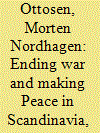| Srl | Item |
| 1 |
ID:
144237


|
|
|
|
|
| Summary/Abstract |
The Napoleonic wars had a tremendous impact on the Scandinavian countries. Political and social upheaval and economic disruption ensured that ending war was no straightforward or rapid process. For traumatized veterans and those who had lost a husband or father, war never quite ended, to say nothing of those who remained under military occupation even after the nominal conclusion of peace. Still, the parallel process of making peace after 1815 was quite remarkable in Scandinavia, as 300 years of bitter rivalry, enmity, and perpetual conflict rapidly gave way to reconciliation to a point where Scandinavian union was a more likely outcome than a future Scandinavian war.
|
|
|
|
|
|
|
|
|
|
|
|
|
|
|
|
| 2 |
ID:
125055


|
|
|
|
|
| Publication |
2013.
|
| Summary/Abstract |
In this communications piece I want to try and capture some learnings from many years' work in this area of religious harmony. As a Church leader, I have generally had very demanding responsibilities; looking after large areas and numbers of people through our parishes, schools and welfare agencies. Accordingly, I am more a reflective activist than a scholar or academic. At the same time, I am convinced that the success of bringing religions into dialogue depends critically on broadening the base of those involved in these efforts. My commitment to the need for better religious harmony came when I was a University Chaplain at Monash University, Melbourne in the 1980s. Through the inspiration of the university's founders and various benefactors there was an Interreligious Centre, incorporating separate prayer rooms and chapels for different religions. There were sufficient 'religious' wars going on overseas then for us to appreciate how blessed we were to go to and from our Religious Centre in an uncomplicated way. On a Friday, I would be celebrating Holy Communion whilst Muslims were preparing for Friday prayers, Jews for the Sabbath. Incense from the Buddhist prayers would be in the air, along with our frankincense in the thurible. We would reflect that, in many parts of the world, such religious harmony would only invite a 'bomb'.
|
|
|
|
|
|
|
|
|
|
|
|
|
|
|
|